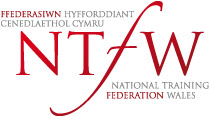
Bilingual Champion
The Work-based Learning (WBL) Bilingual Champion Project is funded by Welsh Government, through the Coleg Cymraeg Cenedlaethol, to support the WBL training providers in Wales to achieve targets as set out in the Welsh Medium Education Strategy; and to support the achievement of ‘Cymraeg 2050’; the Welsh Government’s vision and aim to reach one million Welsh speakers by 2050.
The project aims to work towards the reaching the objectives as set out in the Strategy for the FE and Apprenticeships Sector. Working closely with the Coleg Cymraeg Cenedlaethol, the WBL Bilingual Champion will focus on the 6 key pillars (Learners, Staff, Provision, Resources, Qualifications, and Employers) to identify and overcome barriers; with the aim of increasing the number of apprentices completing their apprenticeships in Welsh or bilingually.
Apprenticeship Ambassadors
As a means to promote the benefits of Welsh-medium and Bilingual Apprenticeships, the Coleg Cymraeg Cenedlaethol fund at least 10 Apprenticeship Ambassadors through NTfW each academic year. The Ambassadors share their experiences of being a bilingual apprentice in Wales and show the joys of being an apprentice, as well as the benefits of using #WelshAtWork (#CymraegYnYGweithle).
Find out more about the Ambassadors:
Annwen Roberts
Celyn Jones
Ceris Jones
Gethin Evans
Iestyn Morgan
Ifan Williams
Lleucu Edwards
Llio Jones
Poppy Evans
Tom Acreman
Gwreiddio Scheme
Any member of staff in the post-16 sector who contributes towards or is interested in Welsh-medium and bilingual education and training is welcome to join the Gwreiddio Scheme, whatever their Welsh language skills. Members of the Gwreiddio Scheme are part of an enthusiastic community of staff, who are working bilingually across the post-16 sector.
Go Further with Welsh
Taking advantage of any opportunities to develop bilingual skills is important for your future employment prospects. Employer surveys show that there is a shortage of workers with Welsh Language Skills, especially within the Health and Social Care, Childcare and Public Services sectors. Here are some of the advantages of bilingual education.
Bilingual Good Practice Guide
The purpose of the Bilingual Good Practice Guide is to share examples of current good practice in the Work-based learning (WBL) sector in encouraging learners to continue with their education through the medium of Welsh. The overall goal is to achieve a bilingual workforce for the future of Wales.
Resources
A list of useful resources is available for you to use including dictionaries; terms, spell checkers; online resources and information on learning Welsh and Welsh translation services. Have a look and see what is available.
For further information, please contact:
Ryan Evans, Bilingual Champion
Email: ryan.evans@ntfw.org
Mobile: 07425 621710

